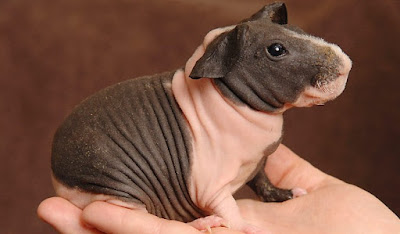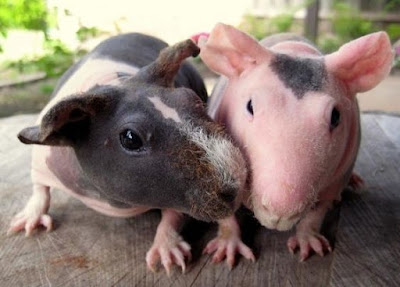Temperament, History, and Care Tips for lab Guinea Pigs with lovable natures!
If you’ve spotted
this seemingly hairless and tiny creature before, you might have already met
the Skinny Pig. Otherwise known as the Guinea Pig breed with almost no hair— only tiny
tuffs on certain parts of their bodies and nose. This is no skin issue, and
they have a pretty interesting back story to tell! Don't you think they look sort of like, tiny, miniature Hippos? ☺
The Skinny Pig
The term “skinny” is
actually derived from how much thinner these guys look without their coat of hair
or fancy tussles like their other counterparts. The Guinea Pigs now are bred with
a hairless strain— possibly originating from a random genetic mutation in laboratories.
First identification happened in 1978, at Armand Frappler Institute, Montreal
amongst a brood of Hartley Lab Guinea Pigs. In 1982, these piggies were sent to
Charles River Laboratories for breeding purposes to serve Dermatology studies.
Appearance Of The Skinny Pig
As mentioned, the
Skinny Pig has little to no hair at all, but if you look close enough, fine tuffs
of hair can be spotted on their muzzles, backs, legs and even their feet. Every
where else looks exactly like a Guinea Pig wearing its layer of skin with no exterior
“protective” coat of hair— naked.
 |
| Source |
Their skin is smooth with some wrinkling
around the legs and neck areas and they come in a variety of patterned markings
(where hair supposedly should have grown
to make out these patterns). Of which includes Tortoiseshell, Dutch,
Himalayan and more.
Grooming Requirements Of The Skinny Pig
While it is safe to assume
that grooming is minimal since Skinny Pigs do not require combing or brushing— they require a little more attention when it
comes to protecting them from the heat or cold. Keep them indoors at all times,
ensuring their home and environment are filled with ample fleeces and nooks
they can nestle up within to keep warm, remember, they have no exterior protection.
 |
| Source |
When it gets a little
too hot, be sure that their homes are not near the sun rays, to prevent
sunburns. Maintain a clean living-space at all times so your Skinny Piggies are
not prone to getting skin infections, and wipe them down with a damp cloth to
get into creases and keep their skin clean. Thereafter, dry them thoroughly.
Quick Care Tips
Housing — A good and comfy home for Skinny Pigs or any guinea pig would be soft and quality bedding. Some owners opt for fleece towels or even hay, just ensure cleanliness at all times. Avoid Pine and Cedar wood bedding as it may lead up to respiratory issues. Straw is also not advisable for absorbency purposes.
Ensure the living space/cage is of an appropriate size, large enough for your active Cavy to run and roam about. To prevent them from eating soiled hay, clean their living space regularly and provide fresh food and water!
Feeding — Good quality Hay is an absolute staple in a Guinea Pig's diet. Introduce a plate of hay for food with food pellets mixed in. Guinea Pigs require a ton of Fiber and Vitamin C, inclusion of fresh vegetables and occasional fruits treats are healthy. Recommendations for good quality Hay types are Timothy Hay, to encourage healthy teeth and a good digestive system.
View Related:
Skinny Pig Temperament And Behaviour
These scantily clad piggies have a friendly, affectionate
and curious nature that loves human companionship as much as any other Guinea
Pig breeds. It may take a while to gain their trust, however it is a natural
process every hopeful owner should encounter! With patience, proper care and
love, a Skinny Pig’s average lifespan is 6 to 8 years. Be ready for the
responsibilities a Skinny Pig may bring you, for their only skin protection may
jolly well be your attentive care!
 |
| Source |
Related Articles:
Your Stories Can Be Heard Too
Do YOU have a story to share? Your voices are important to us and the Pets community! Our readers are encouraged to share their Pet-related reviews of a place and its services, experiences, even lifestyle tips and tricks to better our Pets lives, on our platform, one paw at a time. Be a part of an educational and informative Pets community because at ThePetsDialogue, your voices could make a huge difference on a global scale.
Write to us at [email protected] today!
Our website is a work in progress, however, if you did find our articles interesting please do feel free to share! For more Pet care tips and other Pet-related articles, head to www.thepetsdialogue.com ☺
Disclaimer
This article was written with informational purposes, as you know, we’d love to share our collective research and experiences as fellow Pet owners and lovers. It is not meant to alternate in any way as advice or diagnosis of Professionals.
ThePetsDialogue claims no credit for images posted on this article unless otherwise displayed/stated. All rights go to respective owners as mentioned. If you do not wish for your image(s) to appear here do drop us an e-mail and it will be removed promptly. If you do wish to use any of our original published information, you are welcome to contact us!





No comments:
Post a Comment